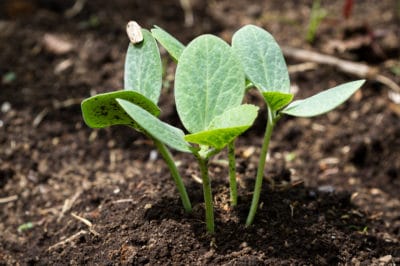When to Plant Butternut Squash
Like other winter squash like spaghetti and acorn squash, butternut squash requires a long growing season. Most types of butternut need 110-120 days to mature. Additionally, they do not tolerate cold at all.
Before planting the seeds, you need to be sure the soil temperature is at least 60°F (18°C). This usually occurs around two weeks after the last frost date for your growing region. You can purchase a soil thermometer at any home and garden store, and unless you are an experienced gardener, this tool will come in handy time and time again.
Tip: If you are unsure of your growing zone, a local nursery will be happy to help you figure it out.
Sowing Butternut Seeds Indoors
If you live in an area with a short growing season, you can also plant your butternut squash seeds indoors. Although winter squash perform best when planted directly in the ground, you can still have a favorable harvest if you start the seeds indoors.
To start your butternut squash seeds indoors, follow these steps:
- Fill plantable peat pots with organic potting soil.
- Push the butternut squash seeds into the soil at a 1 inch (2.5 cm) depth.
- Water the seeds until the soil is damp but not dripping.
- Place in a sunny location and water whenever the soil appears dry.
The seeds should germinate in 7-10 days, and you can transplant them outdoors when they have grown two full sets of leaves.
Tip: You can also buy seedlings from your local nursery if you do not want the additional work of starting them indoors.
Essential Elements for Planting Butternut Squash
Butternut squash, like all varieties of winter squash, thrives in full sun for at least 6-8 hours each day. These plants also require regular fertilizing with an organic fertilizer, and at least one inch (2.5 cm) of water each week.
Since weed control is also essential, you can apply a thick layer of compost at the base of each plant. In this way, you provide extra nutrients for the plants as well as some natural weed suppression.
As long as you take care to plant the butternut squash seeds to allow for their long growing season, you can expect a plentiful harvest from these sturdy plants.
